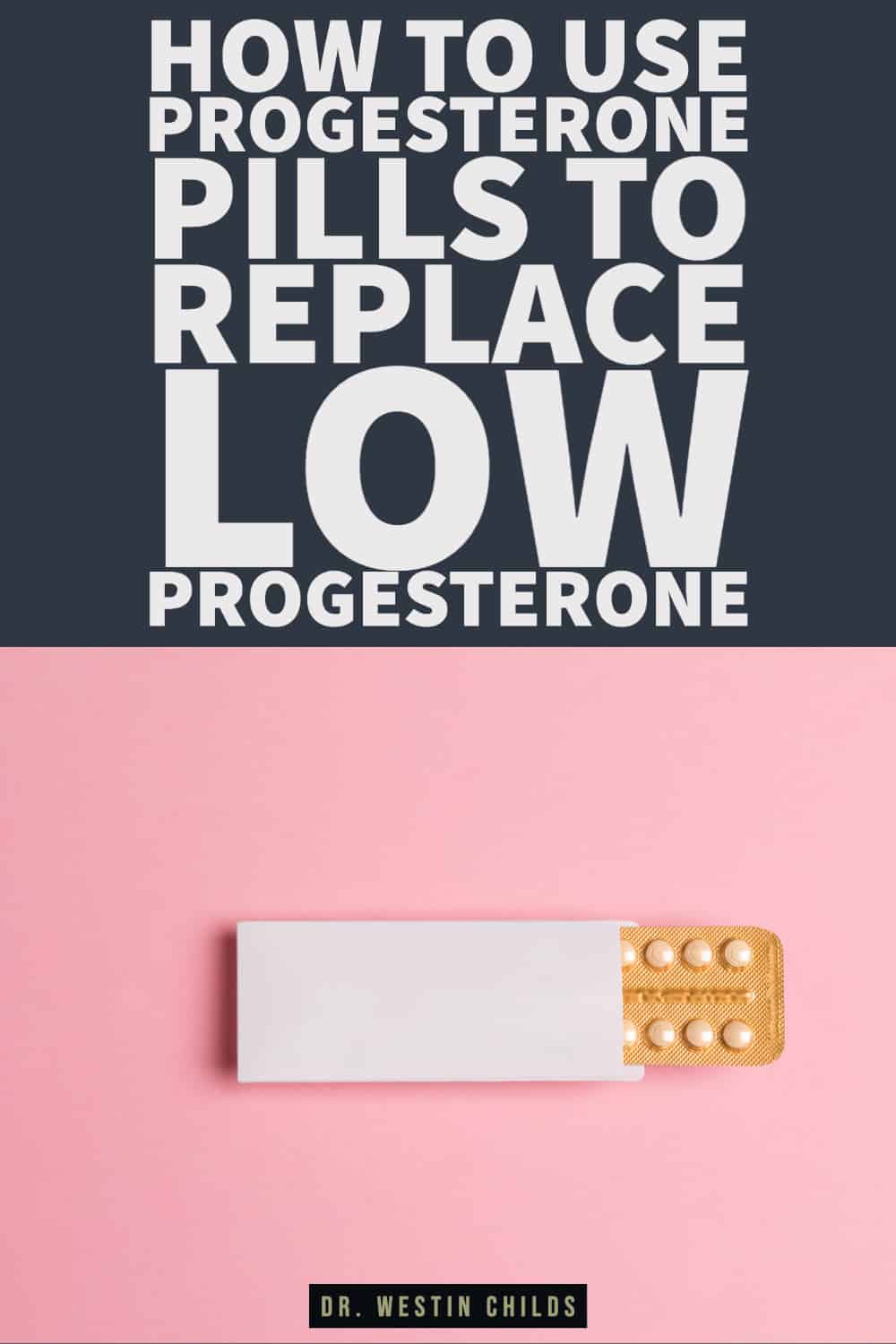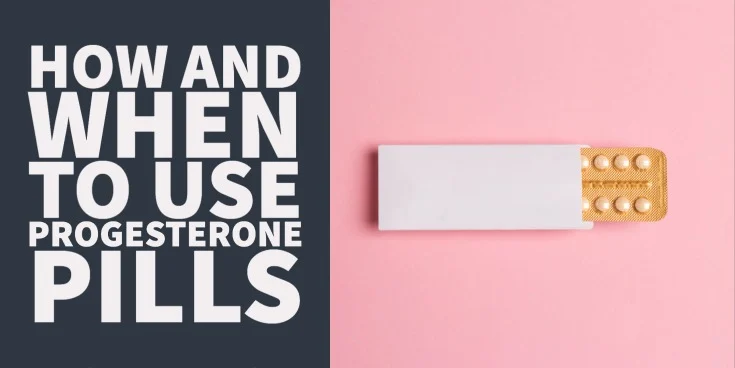Are you suffering from the symptoms of progesterone deficiency?
Have you recently been prescribed progesterone pills?
Are you wondering if you should use progesterone cream or progesterone pills?
Learn everything you need to know about progesterone pills in this guide, including how and when to use progesterone, the differences between progesterone cream and progesterone pills, side effects associated with progesterone use, and more:
What are Progesterone Pills?
Progesterone pills are simply a way to deliver the steroid hormone progesterone into your body.
But before we talk about why progesterone pills may be beneficial, you need to have a basic understanding of how progesterone works.
If you understand how progesterone works then you’ll better understand why taking oral progesterone (progesterone pills) may be beneficial and necessary in your body.
So what is progesterone?
Progesterone is one of the two major female sex hormones in women, the other being estrogen.
Progesterone is so named because in the 1930’s it was found to be necessary for pregnancy (1).
The term “pro” means it is required for and the term “gesterone” is short for “gestation” which means pregnancy.
So when you break down the word progesterone it literally means a hormone that is required for pregnancy.
And it is definitely required for pregnancy! But it has so many other benefits as well.
Progesterone helps to balance out the powerful effects of estrogens in your body.
These benefits are important to understand because understanding what progesterone does in your body will help you know if you have a deficiency of this important hormone.
Progesterone is absolutely required in optimal amounts to help balance the effects of estrogen which tend to cause the exact opposite effects on the body.
You can think of estrogen as a hormone that helps to build and grow tissues (such as menstrual lining, breast cells, fat cells, etc.) (3) while progesterone helps to counteract these effects by helping to shed the menstrual lining (during menses), calm down the stimulating effects of estrogen on breast tissue and help maintain body weight.
There are many conditions and disease states which may alter the concentration and ratio of progesterone to estrogen in the female body.
When this ratio is altered women may present with symptoms such as depression, weight gain, menstrual irregularity, infertility, and so on.
Progesterone pills are often used as a way to help treat this imbalance, especially in states which result in progesterone DEFICIENCY or low progesterone.
Progesterone Pills vs Progesterone Cream
It turns out that there are actually several ways to put progesterone into your body.
Remember:
Progesterone is simply a hormone and how we put the hormone into our body may impact how our body metabolizes and uses it.
Hormones tend to be more difficult to get into the body when compared to other more water-soluble medications (meaning medications that dissolve in water).
The reason for this is that they are not as readily absorbed in the intestinal tract.
This is required because only a small percentage of the hormone is actually absorbed.
Hormones taken by mouth also have to pass through the liver, before they reach arterial circulation, which may further break them down and inactive them.
These problems lead to the development of micronized progesterone pills which help to dramatically increase absorption.
But is taking progesterone by mouth preferred to taking progesterone through the transdermal route (through the skin)?
This question is more difficult to answer.
In general, when we are using hormones, we want to make sure that we follow 3 very important rules:
#1. Always try to emulate or copy the way that the body produces the hormones.
#2. Always use identical copies of the hormone we are supplementing with.
#3. Never take more than is necessary (don’t use too much).
Following these rules will help reduce unwanted side effects and help improve the efficacy of the hormone that you are supplementing with.
These rules apply to progesterone as well.
The first rule mentions that we should always try to copy the way that the body produces hormones naturally.
In the case of progesterone, it is produced directly from ovarian follicles (in your ovaries) and in the cortical area of your adrenal glands.
From there it is then secreted into the blood where it is taken to all of the necessary tissues that need it (brain cells, breast tissue, uterine lining, etc.).
Does taking progesterone by mouth (progesterone pills) mimic this pathway?
Not really.
Progesterone which is taken by mouth is first absorbed directly into the venous portal system where it is FIRST taken to the liver.
In the liver, it is broken down into many different metabolites such as pregnandiol, pregnanolone, pregnandione, and 17-OH-progesterone (6).
It is well known that taking oral progesterone results in a large increase in progesterone metabolites, especially pregnandiol, which is not how it would normally occur in your body.
Does this mean that oral progesterone should not be taken?
No, but it does mean that you should take caution when using progesterone pills and be sure to consider the alternatives such as progesterone cream.
The good news is that progesterone cream offers an alternative way to take the medication and can be used if you do not see the desired beneficial effects of oral progesterone.
You can learn more about using progesterone cream including dosing and pros and cons in this guide.
I’ve also outlined some of the basic pros and cons of using progesterone pills when compared to progesterone cream below:
PROS
- May be better for women suffering from insomnia
- May be more potent compared to progesterone cream
- Ideal for women who don’t respond to progesterone creams
- Better safety profile when compared to progestins
CONS
- Require a prescription from a Doctor
- Cause an increase in progesterone metabolites compared to progesterone cream
- More difficult to dose (fewer dosing options)
You can use these as a rough outline to help you determine if progesterone pills would be better for you over progesterone cream.
Bio-Identical Progesterone vs Progestins & Progestagins
When we talk about progesterone it’s important to focus on the different types of progesterone formulations available.
The best type of progesterone to use is the bio-identical version which is the EXACT same as the hormone that your body produces naturally (assuming normal function).
Believe it or not, there are actually many other synthetic forms of progesterone available as well.
These different forms can be difficult to distinguish (some of this is probably on purpose) so it’s important that you understand the basics.
Use this information as a quick guide to help you:
Progesterone = the hormone that your body produces naturally from the ovaries and your adrenal glands.
Progesterone USP (7) = the bio-identical form of progesterone created and used in progesterone creams and progesterone. The best example of this is Prometrium which is a bio-identical progesterone pill.
Progestin (8) & Progestogens (9) = Synthetic versions of progesterone but these are NOT the same as what your body produces naturally. These are commonly found in birth control pills and other “progesterone” medications.
Why is this important?
In addition, synthetic progesterone may also cause depression, weight gain, and other side effects (11) which are not seen with bio-identical progesterone use.
And this makes sense if you think about it.
Would you rather put an identical and exact replica of a hormone into your body (bio-identical hormones) or would rather put a synthetic not-quite-the-same version that acts similarly but is not the same as the real hormone?
The answer should be obvious, you should be seeking out the identical version.
Your body already knows what to do with the identical version and it knows how to get rid of it and how to balance it.
Your body doesn’t necessarily know how to eliminate the new synthetic hormone.
And it may be that the unintended byproducts created when your body tries to eliminate these hormones may be the reason for the higher risk of breast cancer and other symptoms seen with synthetic progesterone use.
Because of these very important differences, it’s necessary that you understand what type of progesterone you are taking.
Bottom Line: Whenever possible try to use bio-identical progesterone (such as Prometrium) and avoid synthetic versions of progesterone such as progestins and progestogens. Synthetic progesterone may carry an increased risk of negative side effects compared to bio-identical progesterone.
Do you need to use Progesterone Pills?
So how do you know if you need to use progesterone pills?
The first step is to identify that you have some condition in which you are either progesterone deficient or in which you have an abnormally high amount of estrogen in your body.
Conditions that meet these criteria include:
- Infertility (12)
- Endometriosis
- PCOS
- Progesterone deficiency
- Estrogen dominance
- Primary or secondary amenorrhea
- Menopause
- Supporting IVF
- PMS/PMDD (13)
- Age relate-decline in progesterone
- Women with low serum progesterone
These are documented medical conditions in which the use of progesterone (pills or creams) may be indicated and in which progesterone would be considered a treatment or therapy.
If you notice these are all conditions which cause one of two problems:
#1. Progesterone deficiency (meaning you don’t naturally produce enough progesterone for your age).
Conditions that meet these criteria include menopause, age-related decline in progesterone, primary amenorrhea, and infertility.
#2. Excess estrogen (meaning you have excess estrogen production related to progesterone production).
Conditions that meet these criteria include PCOS, endometriosis, and estrogen dominance.
Progesterone is ideal for conditions such as these.
But remember:
Progesterone is a powerful hormone and one that may cause side effects if not used correctly.
Side Effects of using Progesterone (Including Weight Gain)
The good news about progesterone is that, as long as it is used correctly, negative side effects should be minimal.
The idea with progesterone supplementation is to provide your body with only the exact amount of hormone that you are deficient in.
What do I mean?
Each woman who needs progesterone (based on her condition) will require a DIFFERENT amount when compared to other women.
This is completely normal and to be expected.
If we lined up 100 HEALTHY women and we checked their progesterone, do you think they would all be the same?
The answer is definitely no.
Your sex hormones help to define your physiology, body mass index, size of your breasts, muscle mass, and so on.
What is considered “normal” for you may not be considered “normal” for another woman.
So how do we approach treatment?
The idea is to use the smallest possible amount of progesterone (and by the way, this applies to all hormone replacement therapies) necessary to reduce your symptoms and treat the condition you are aiming for.
Following this advice will help reduce the number of negative symptoms that you experience.
Most of the time the symptoms related to progesterone pill use are secondary to either using too much hormone or using the wrong type of progesterone (for instance using cream instead of pills).
But how do you know if your dosing is insufficient?
The best way is to monitor your symptoms when taking progesterone.
I’ve provided a list of symptoms below which may indicate that your dosing is “off” if you are using progesterone pills:
- Weight gain (you should never experience weight gain when using progesterone)
- Increase in fluid retention or bloating (progesterone use should normalize fluid levels in your body)
- Depression or anxiety (14) (progesterone should help balance your mood)
- Menstrual irregularities (progesterone should help regulate your cycle)
- Dizziness or loss of balance (may be an indication that your dose is too high)
- Memory problems (may be a dosing problem)
- Not feeling like yourself (many women will experience symptoms that are hard to pinpoint but they know they don’t feel “normal”)
If you experience any of these symptoms be sure to evaluate your serum progesterone level in addition to your serum estradiol level.
Evaluating these labs will help determine if you are responding appropriately to the progesterone you are taking.
Final Thoughts
Progesterone is a necessary and important hormone for optimal health in women.
Progesterone can be replaced using progesterone creams or progesterone pills, but it should be used cautiously and only in the necessary amount.
If you opt to use progesterone pills make sure that you follow your symptoms and your serum progesterone levels.
By taking this approach you should be able to reduce any negative side effects while experiencing balance in your hormones.
Whenever possible stick to bio-identical progesterone (known as progesterone-USP) and avoid synthetic versions of progesterone.
Bio-identical progesterone (such as Prometrium) is preferred as a replacement medication to other forms of progesterone and may cause fewer side effects.
Now I want to hear from you:
Are you suffering from progesterone deficiency?
Are you supplementing with progesterone pills or Prometrium?
Is it working for you? Why or why not?
Have you experienced weight gain while taking progesterone?
Leave your comments below!








